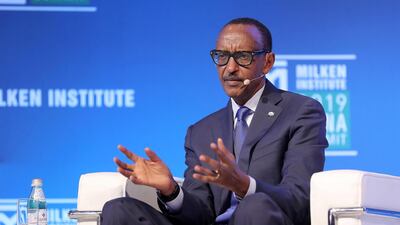Rwandan President Paul Kagame spent his childhood in a refugee camp after his family fled to Uganda. The fact he went on to help lead a liberation force, which brought the Rwandan genocide to an end in 1994 and re-established stability in the war-torn country, is testament to his resilience. But Mr Kagame has not rested on his laurels since taking power in Kigali. Instead, he has overseen Rwanda’s growth from a country on the verge of total collapse to a bastion of cleanliness, peace and prosperity. It is that transformation that has garnered praise for Mr Kagame and his east African nation from leaders across the world.
Under his stewardship, Rwanda has seen annual growth of more than 7 per cent and one of the best gender equality examples in the world, with women in 64 per cent of seats in parliament and 50 per cent of roles in Rwanda's cabinet. As infant mortality has fallen, primary school enrolment has hit nearly 100 per cent. Mr Kagame is certainly not without his critics. There are those who point to his autocratic tendencies and his controversial 99 per cent landslide win in 2017's election. While these matters are important to note, Rwanda unquestionably has been transformed under his leadership.
In an exclusive interview with The National this week, Mr Kagame outlined his style of governance – one that emphasises dialogue and the safe airing of grievances. He criticised leaders who resort too quickly to violence against their citizens, as seen in the recent crackdowns on protests in Sudan and Zimbabwe. As he said, much can be achieved when people work together. Having managed to defuse ethnic tensions in Rwanda, where neighbour turned on neighbour and nearly one million people were killed, his comments are instructive. Citizens can "become immunised" to violence; the instigation of peace – and its absence – is down to people.
Ultimately, the message from Mr Kagame's Rwanda is that conflict resolution and forgiveness are the key to long-term peace and prosperity. It is down to ordinary people who survive a civil war to advance the cause of peace and, as he said on stage at the Milken Institute summit in Abu Dhabi, to find it in their hearts to forgive. It was that understanding that produced the Truth and Reconciliation Commission in post-apartheid South Africa, where perpetrators and victims gave testimony to foster national healing. Other truth commissions have followed in dozens of countries, from Guatemala to the Philippines and Yugoslavia.
Amnesties and apologies certainly cannot right the wrongs of the past but they can unify divided nations. The story of the refugee-turned-president and the country he healed could well serve as an example for other nations to learn from.

